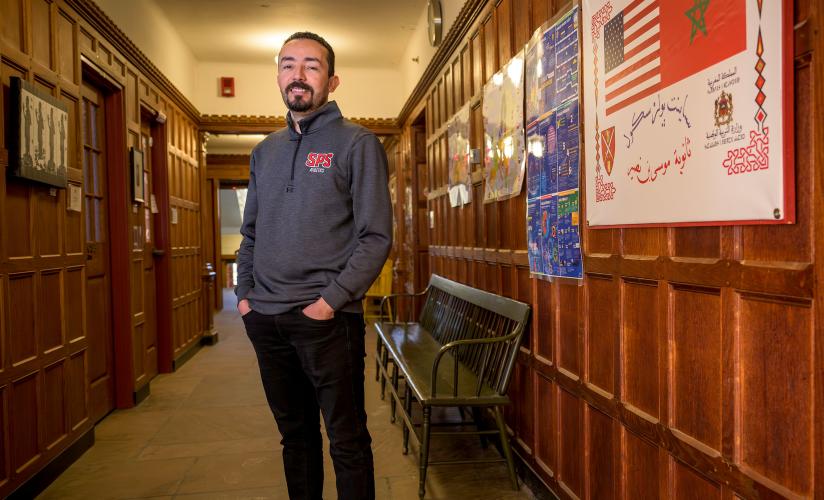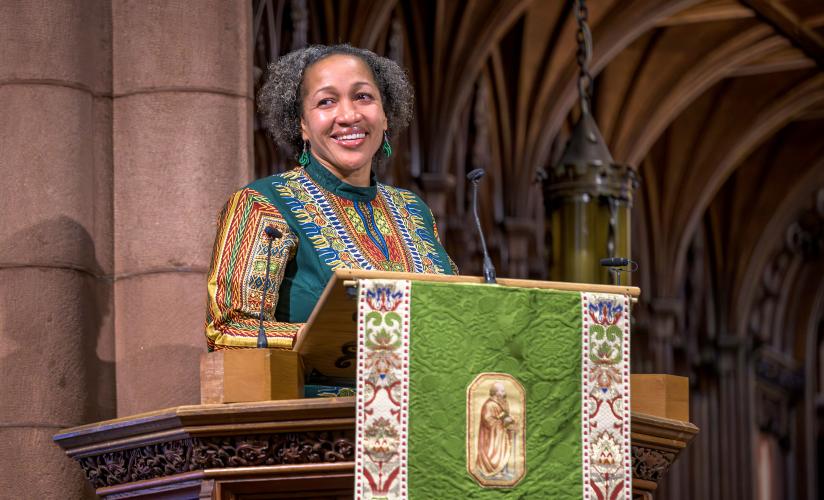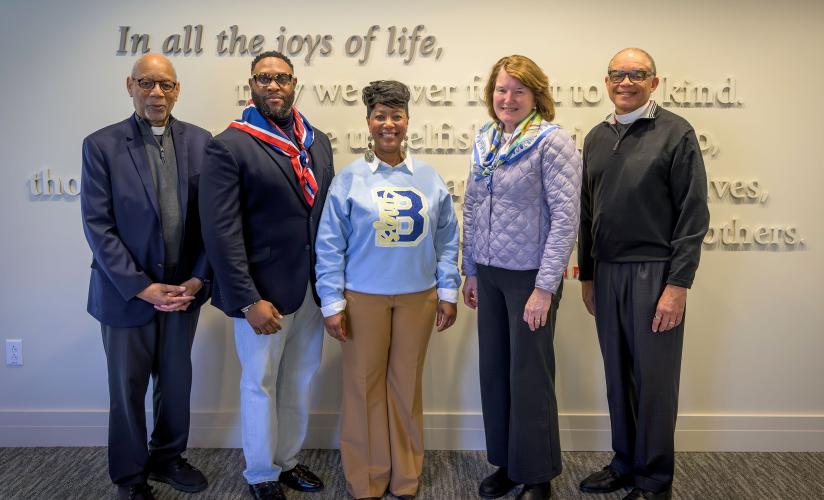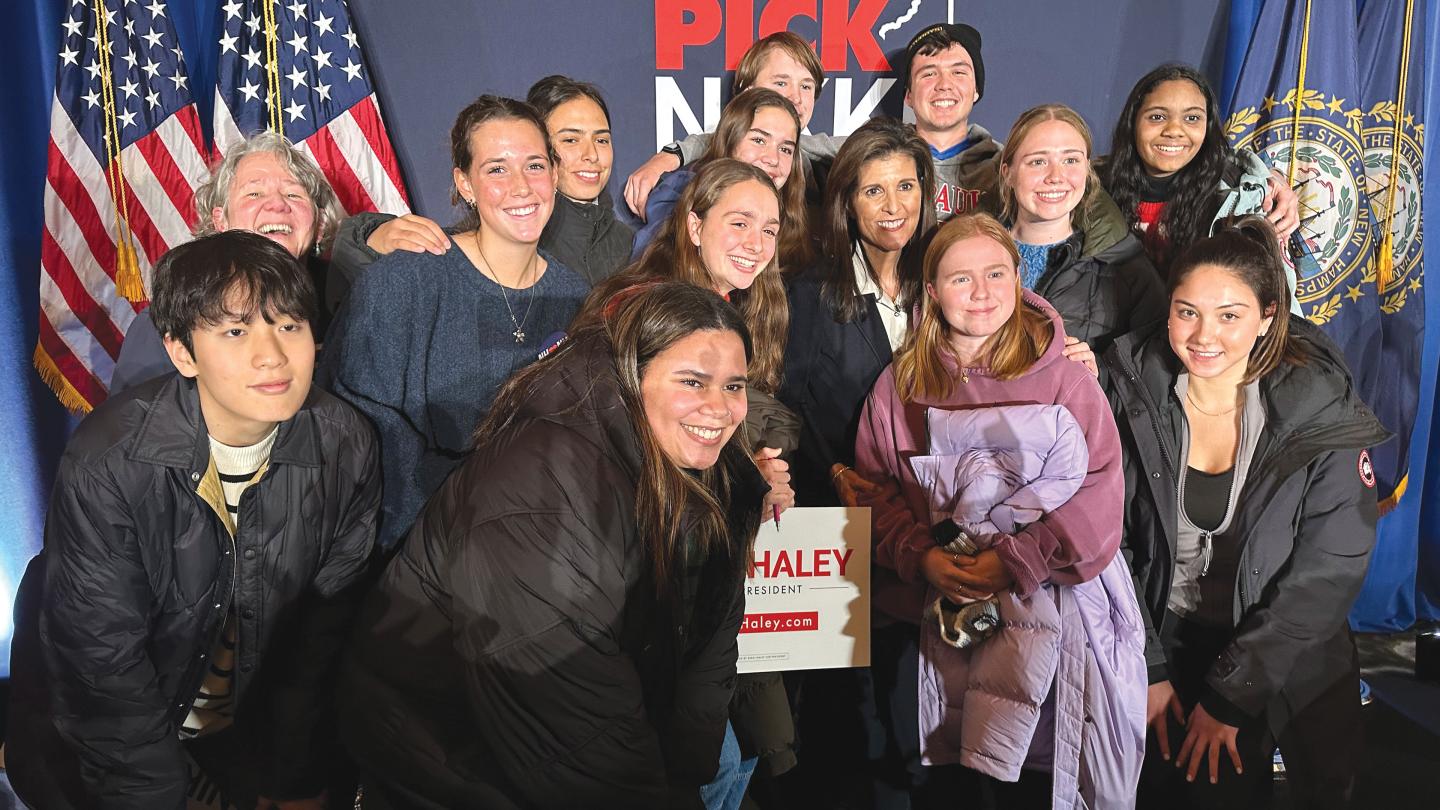
The Student Body Politic

At St. Paul’s School, student engagement in the political process is more than academic, especially in an election year.
BY JODY RECORD
Civic discourse isn’t just about addressing political issues in the public sphere. It’s also about learning how to examine your personal beliefs and engage productively with others whose political positions might differ from yours. That’s one of the many upsides of St. Paul’s School students being involved with recent political campaigns, says Humanities Teacher Christine Carter P’17, who has taught SPS’s American Politics elective for more than 15 years. “They learn to talk across the table and still get along,” she says.
During the 2024 New Hampshire primary season, students learned by more than just talking. They attended a Manchester rally for Republican presidential candidate Nikki Haley. Worked the phone bank for Democratic candidate Dean Phillips. Heard from campus guests that included Andrew Yang, who ran for president in 2020; 2016 New Hampshire gubernatorial candidate and former New Hampshire Executive Council Member Colin van Ostern; and Jeff Grappone ’98, who has run several political campaigns and serves as executive vice president and chair of public relations practice at bipartisan ROKK Solutions in Washington, D.C.
“To me it’s just that experience of grassroots politics,” says Carter, the Richard F. Davis Chair in Humanities, of the mix of voluntary (phone-banking, hearing from Haley and Yang) and curriculum-based (class visits with van Ostern and Grappone) activities offered to students this winter. “They worked phone banks, they got to talk to people, they got hung up on, they learned what it’s really like to be part of a campaign.”
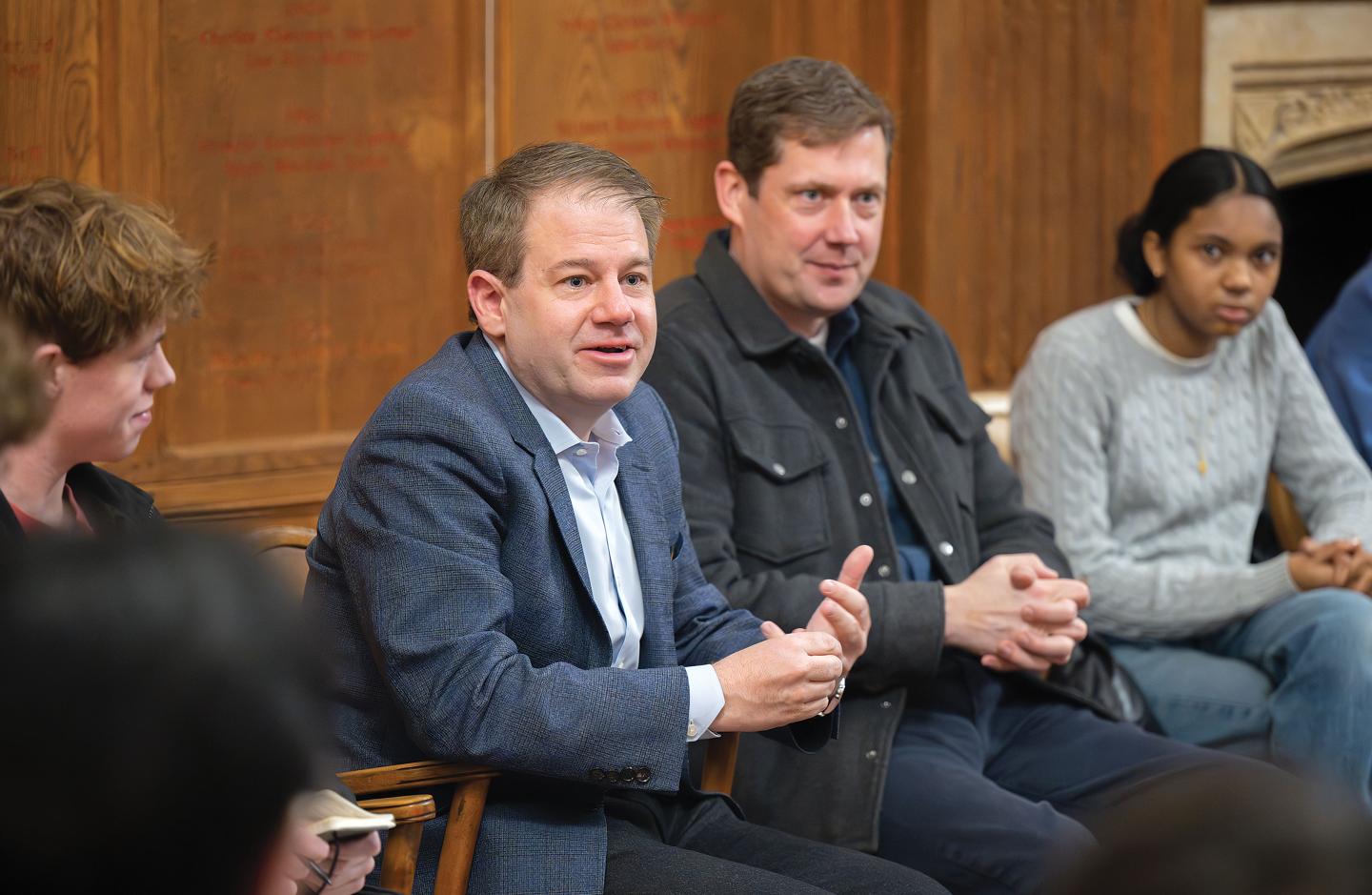
Students hear from political strategist Jeff Grappone ’98 and New Hampshire Executive Council Member Colin van Ostern in February.
If they were old enough, they also went to register to vote — a group of about 50 students that included Emily “Milly” Kirkman ’25 went together to the Concord City Clerk’s office. Kirkman recounts that with each new voter who was registered, a man would ring a bell. After a while, he stopped ringing it because there were so many of them, but “I said I wanted him to ring the bell for me, that it mattered,” she says. “To not ring it made it feel like it didn’t matter. I said I wouldn’t leave until he rang it.”
He rang the bell.
Kirkman, who is from Vermont and Massachusetts, says she thinks it’s important for everyone to have some kind of political understanding. “In class, asking questions about policies, for example, two things stood out: what does that policy do for me, and by supporting it, what does that say about me? If I wasn’t educated, it would have been easy to look at what a particular policy does for me, but taking this class I see how it can impact other people. It has been a great opportunity.”
A great opportunity of a different kind presented itself to Declan Schweizer ’24 while attending the Haley rally. An amateur photographer, Schweizer had his camera with him. As soon as he walked in, a campaign worker shuttled him up to the stage where photographers from The New York Times, Getty Images, The Boston Globe and others were staked out.
“They got me a press pass and I was up there with these big-time, well-established photographers,” says Schweizer, who is in Humanities Teacher Abbey Edwards’ American Politics class. “I got the same access as the official photographers. It was an incredible experience.”
As was introducing Andrew Yang to a standing-room-only crowd of students and teachers in the Lindsay Center for Mathematics and Science when the former presidential candidate came to the School to speak.
“I got to introduce him and talk to him,” Schweizer says. “He’s a very, very informed guy. … He’s got all the numbers. I’ve been interested in politics since before taking Ms. Edwards’ class. These opportunities offer a rich experience no matter which side of the aisle you are on.”
Carter says that’s one of the most important lessons she hopes students take away from their engagement with the political process: becoming informed, and learning to appreciate perspectives that might or might not line up with their own. Fact-checking, she adds — including oneself — is an important part of the learning process, particularly for a generation of learners who rely on social media for their news.
“People talk about [the power of] social media, but is it fact-checked?” she asks. “You have to look at how it plays into your own bias; you have to read more than the headlines. Where you get your information is important. How you use that information is important to becoming an informed individual.”
Testing ideas in the real world is important too. “I tell my students, ‘if you want to defend your beliefs, if you want to really be involved in whatever those beliefs are, you have to talk to as many people as you can,’” she says. Class discussions and boots-on-the ground experiences with as many campaign opportunities as possible are aimed at helping students clarify their beliefs — among other things.
“That’s the thing about New Hampshire, you see candidates everywhere,” Carter says. “The School is very supportive about us grabbing the opportunity at the moment and going.”
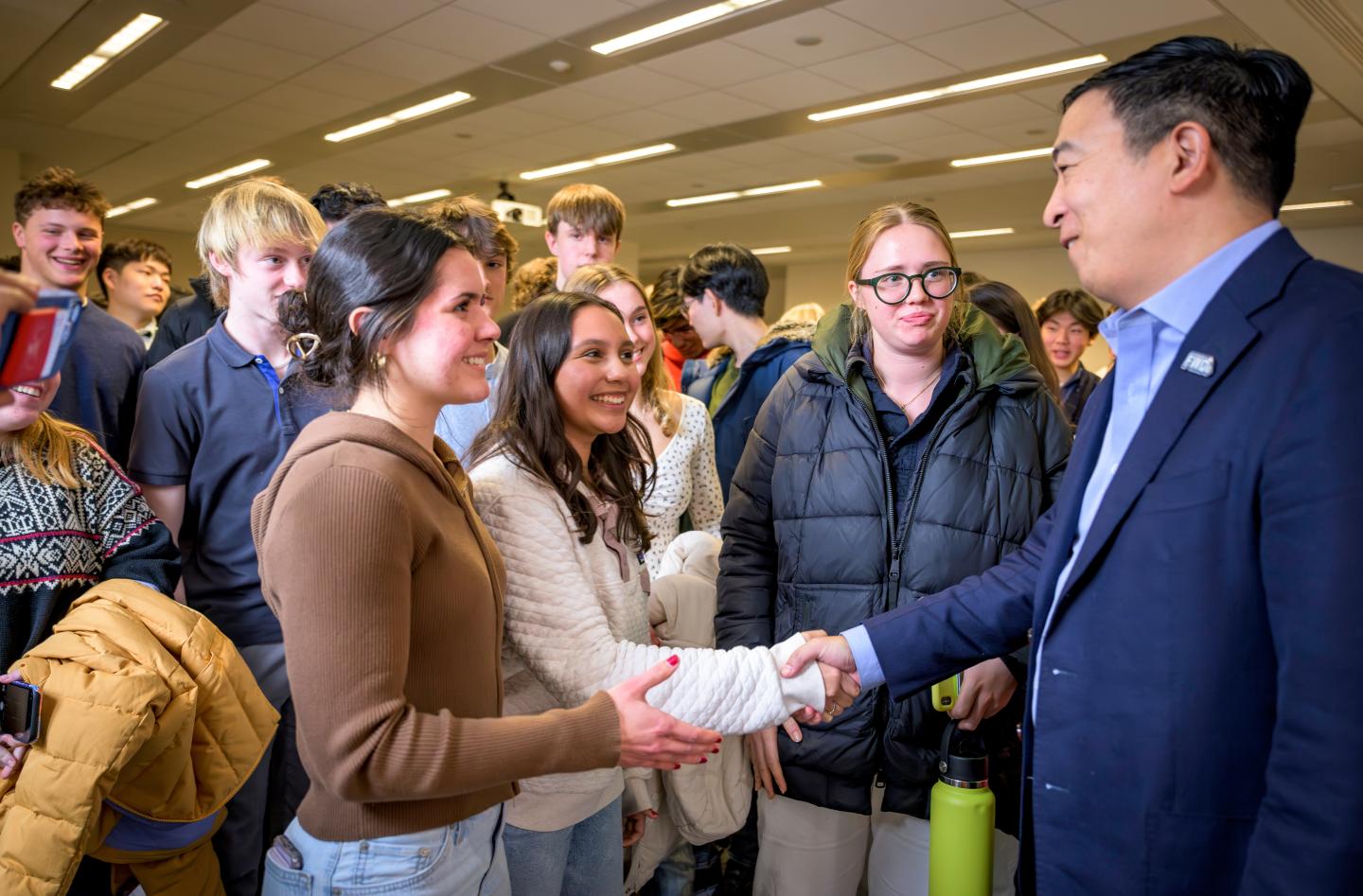
Students meet Andrew Yang during his visit to SPS in January 2024
Susan “Nel” Peter ’25 is among the students who deeply appreciate those opportunities and the manner in which they extend classroom learning.
“Ms. Carter wants to expose us to as much as possible. She does a great job of encouraging people to try new things, but not pushing anyone to do something they aren’t comfortable with. It’s awesome to be able to experience national politics at the local level in a way that I would never get to in Connecticut,” Peter says of her home state. “Just to be able to participate in and better understand grassroots politics by experiencing it is super valuable. It’s also very valuable to go out into the world and have political conversations with a demographic I otherwise wouldn’t be able to — and a group of strangers, especially.”
Peter attended the Haley rally and was also one of several students who phone banked for Dean Phillips. Cold calling, she says, was an interesting experience. While the majority of people hung up on her, there were those who were respectful.
“I think a cold call is very different than a conversation about politics,” she says. “I did have one conversation with a former high school teacher who very respectfully declined voting for Phillips but commended me on getting involved and staying informed at a young age, which made me feel good. The Nikki Haley rally was interesting because we got to see national politics at such a local level — it was in a small room, and there was a lot of press there who wanted to talk to us. We met Haley afterward. It was interesting to see the [voter] demographic pulling from New Hampshire.”
Nathaniel Dienes ’24 didn’t attend the Haley rally, but he did make phone calls for Phillips.
“It was nice to be able to participate,” he says. “We talked to a wide range of people. Most of them were receptive, some were excited because we were high school students. I don’t know that we changed anyone’s mind, but it was an interesting experience.”
Dienes says he sees a value in learning to talk across the table. To express one’s thoughts and be open to the ideas of others. Like Kirkman, the Sixth Former is in Carter’s American Politics class. “I wanted to take the course because I didn’t think I knew very much,” he explains. “I wanted to talk to people whose opinions differed from mine. A lot of people don’t agree. It’s important to listen.”
Carter and students also talk about talking.
“We’ve discussed a lot about civil discourse and how to foster that inside and outside the classroom,” she says, “talking and disagreeing about what we are learning. I think the classroom is where we start understanding how to do that.”
Even as Carter recaps everything students have had the opportunity to experience, she also highlights what’s still to come. Both her American Politics class and Edwards’ will present a chapel talk about an upcoming primary, and there will be deeper classroom dives on how to pick a president and how politics function in a political year.
“This year they saw big things,” she says of her students. “That’s New Hampshire government right here. I think the takeaway for students is understanding in their own brains what they are reacting to. Sometimes that reaction is based on other factors. These feelings of anger, negativity, that’s not always how it’s been as a nation. I think we negate that by talking to each other.”

